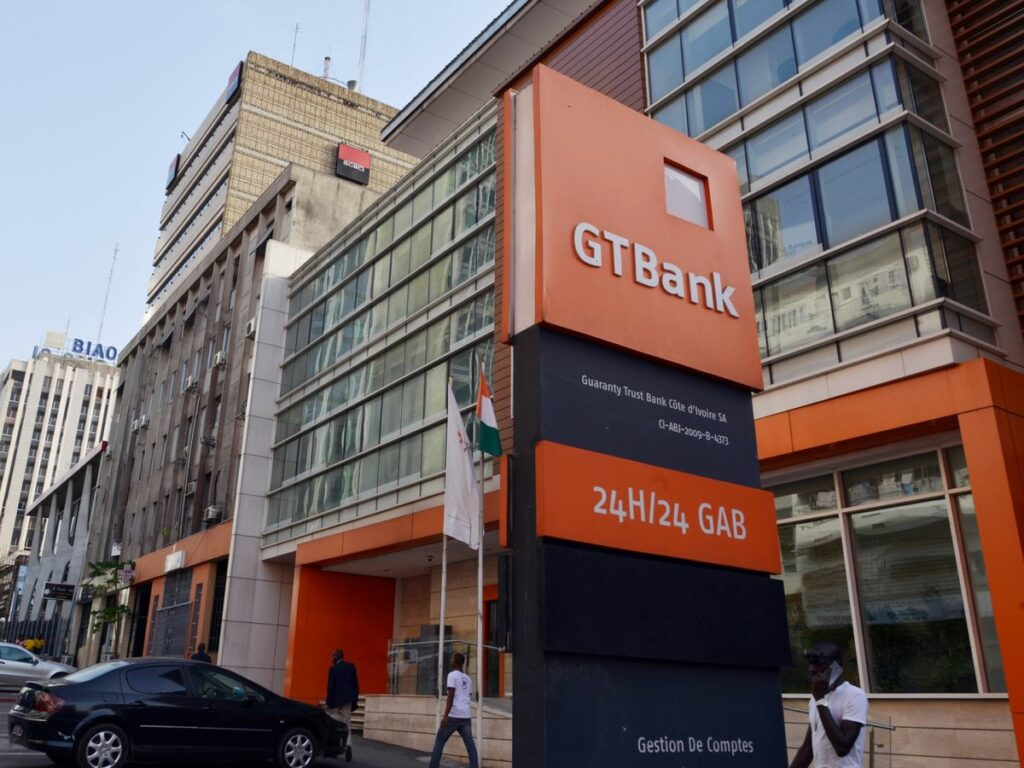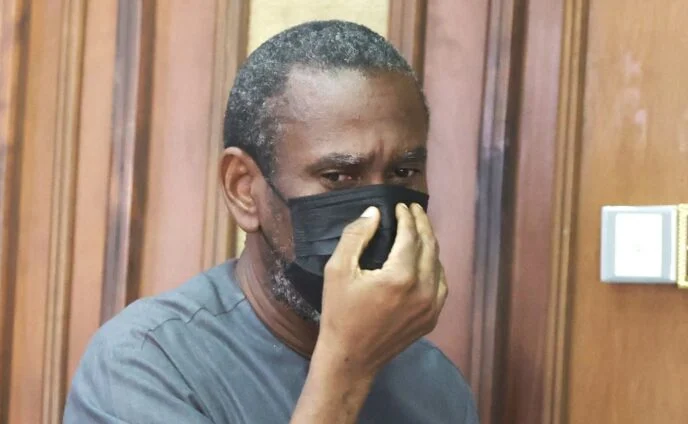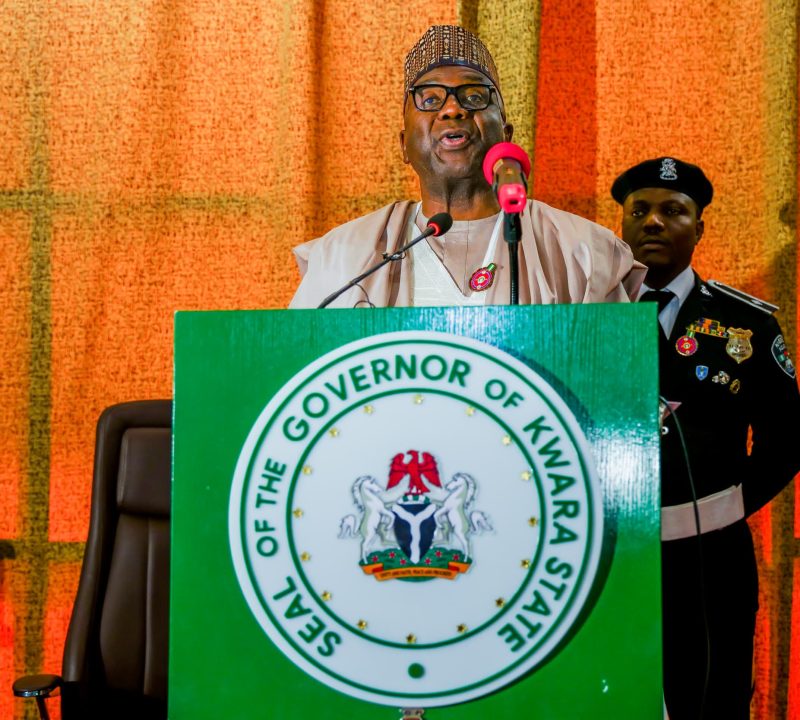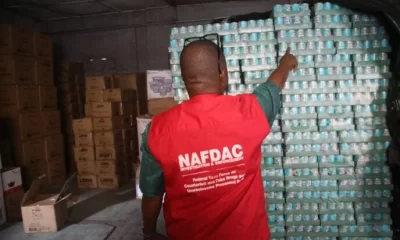Business
GTBank drags 60 bank chiefs to court over N17bn debt

Guaranty Trust Bank has dragged no fewer than 60 top executives of 13 commercial banks to court as a pending suit between GTBank and Afex Commodity Exchange over N17bn Anchor Borrowers Programme loan lingers.
The 60 executives including the chairmen, chief executive officers, directors, and company secretaries of the 13 banks are facing contempt proceedings for allegedly failing to implement a No-Debit-Order reportedly placed on the accounts of Afex Commodity Exchange with the banks.
In suit no FHC/L/CS/911/2024 involving Guaranty Trust Bank Limited and AFEX Commodities Exchange Limited, the Federal High Court, Lagos division presided by Justice CJ Aneke signed an order for the bank chairmen, MDs, directors, company secretaries and the liquidator of Heritage Bank (Nigeria Deposit Insurance Corporation) to be committed to jail for failing to obey its May 27, 2024 ruling.
A legal notice titled ‘Order to serve notice of disobedience to order of court vide newspaper publication’ published in some national dailies including The PUNCH on Thursday, partly read, “An order granting leave to the Plaintiff Applicant to serve Form 48 (Notice of Consequences of Disobedience to Order of Court) dated 11th June, 2024 and all other forms and processes that may be issued in this contempt proceedings inclusive of Form 49 on the 1st-60st parties cited for contempt.
The matter was adjourned to next Thursday.
Parties cited for contempt include Access Bank, Citibank, Jaiz Bank, Union Bank, Fidelity Bank, First Bank of Nigeria Plc, First City Monument Bank, NDIC (liquidator for Heritage Bank), Polaris Bank, Stanbic IBTC Bank, Standard Chartered Bank, Taj Bank, United Bank for Africa and Zenith Bank alongside its principal officers.
In the court ruling dated May 27, 2024, twenty banks were directed to transfer monies standing to the credit of the respondent into the AFEX’s account with GTB until the N17.81bn is repaid.
The N17.81bn loans comprise N15.77bn; the amount outstanding and unpaid, as of April 17, 2024, and the cost of recovery and incidental expenses in the sum of N2.04bn.
The court also granted an injunction allowing GTB to take over AFEX 16 warehouses located across seven states and sell the commodities stored in them, which it said were procured with the Central Bank of Nigeria Anchor Borrowers’ loan facility.
Earlier in the month, the court had served contempt proceedings against AFEX and some of its principal officers including Ayodele Balogun, Jendayi Fraaser, Justin Topilow, Mobolaji Adeoye and Koonal Ghandi.
According to court papers, AFEX had sourced the Anchor Borrowers Programme Loan facility from GTB to provide finance for smallholder farmers registered under the CBN Anchor Borrower’s programme.
The loan was expected to be repaid from the sale of commodities. However, AFEX failed to uphold its end of the deal even after an extension.
In a statement following the interim court order, AFEX claimed that it had repaid about 90 per cent of the loan facility.
“However, a portion of the loan remains outstanding with the farmers and while we have paid out a portion out of our own purse, we remain in discussions with CBN over the outstanding amounts of the said facility,” the exchange said.
It also said the full value of the loan was utilised to provide input to farmers in three consecutive seasons, starting in 2020.
The exchange added that it had remained consistent with repaying the loans until economic headwinds impacted the operations of the farmers that they had disbursed the money to.
“Over 800,000 hectares of farmland were financed through the course of the programme’s operationalisation; however, significant macro and policy headwinds, including the cash crunch on the back of the Naira redesign policy, severely impacted the productive capacity and market participation of the smallholder farmers in the 2022/2023 season.
“This resulted in less than 40 cent repayment from farmers on their input loan bundles, down from our 90per cent repayment rates in the previous eight years of providing input financing for farmers. The low repayment rate ultimately impacted on our ability to refund the full value of the loan at the end of Q1 2023 and following a 6-month extension period,” AFEX added.
The commodities exchange also stated that the lingering effects of the cash crunch have continued to impact farmers, who sold at below market value to get immediate cash inflows to sustain their families in the period and remain unable to pay back.
Meanwhile, AFEX has called on the Central Bank of Nigeria to activate the collateral guarantee of up to 70 per cent clause included in the Anchor Borrowers programme.
“Evidenced in the attached letters, our engagements with Guaranty Trust Bank Limited, a Participating Financial Institution in the program, as well as the apex bank have seen us highlight these limitations on the part of the defaulting farmers with suggestions being made to the CBN to activate the risk-sharing structure put in place for the program and release funds accordingly to sustain activities and allow for needed recovery efforts in our agriculture sector.
“In light of these engagements, we consider the recent steps by Guaranty Trust Bank Limited to be premature, coming in the midst of open conversations that are being had with all parties to find a path to resolution that does not unduly punish farmers, who have been the biggest hit by macroeconomic conditions that they had no control over,” AFEX concluded.
CBN at the inception of the programme in 2015 said the broad objective was to create economic linkages between smallholder farmers and processors to increase agricultural output and ensure food price stability.
The Anchor Borrowers’ Programme guidelines stipulate that upon harvest, benefiting farmers are to repay their loans with produce (which must cover the loan principal and interest) to an anchor, who pays the cash equivalent to the farmer’s account.
By 2022, at least 4.8 million people had benefitted from the Anchor Borrowers Programme and the CBN in a 2023 statement said it released N1.079tn under the programme, out of which over N500bn is due for repayment.
The programme has since been discontinued by the CBN as it pivots from development financing interventions to its core duty of price and monetary stability.
Business
Court remands businessman Akintoye Akindele over $35m contract fraud

The federal high court in Abuja has remanded Akintoye Akindele, chief executive officer (CEO) of Duport Midstream Company Limited, at the Kuje correctional centre.
On Tuesday, Akindele was arraigned by the Economic and Financial Crimes Commission (EFCC) on a four-count charge bordering on money laundering and contract fraud.
The anti-graft agency accused Akindele of allegedly collecting $35 million from the Nigerian Content Development and Monitoring Board (NCDMB) to build a 2,000 barrel-per-day refinery, jetty, gas plant, data centre, and tank farm at Okpoama community in Brass LGA of Bayelsa state.
The EFCC alleged that Akindele received the funds through the bank account of Atlantic International Refinery and Petrochemical Limited and funneled the monies into four of his companies and bureau de change outlets.
The companies are Platform Capital Investment Partners, Duport Midstream Company Ltd., Puisance Afrique Dynamics Ltd., Adamantine Petrochemical & Refinery Ltd.
“That you, Akindele Akintoye, and Platform Capital Investment Partners Limited, between December 2020 and February 2021, within the jurisdiction of this Honourable Court, indirectly retained the sum of $16,006,000 (Sixteen Million, Six Thousand United States Dollars), being part of the funds dishonestly converted from the money paid by the NCDMB to Atlantic International Refinery and Petrochemical Limited as investment, knowing the said sum constituted proceeds of unlawful activity, thereby committing an offence contrary to Section 15(2)(d) of the Money Laundering (Prohibition) Act, 2011 (as amended by Act No. 1 of 2012) and punishable under Section 15(3) of the same Act,” one of the counts reads.
The defendant pleaded not guilty to all the charges.
After the ‘not guilty’ plea, Ekele Iheanacho, counsel to the EFCC, asked the court to remand Akindele in the custody of the correctional centre and seek a trial date.
However, Emmanuel Esadio, counsel to the defendant, told the court that a bail application has been filed and served on the prosecutor.
In his response, Nwite said it will take a 48-hour period for the bail application to be considered.
Esadio requested that his client be remanded in the custody of the anti-graft agency.
However, Iheanacho opposed the request, arguing that the EFCC lacked adequate facilities.
The EFCC counsel said the defendant had demonstrated untrustworthiness by collecting his international passport and claiming that it is in the court’s custody.
“The defendant cannot be trusted. He has shown tendencies that suggest he may commit another crime,” Iheanacho said.
“Additionally, there is no medical evidence before the court to support claims of ill health.”
The trial judge remanded the defendant at Kuje correctional centre and adjourned the case to December 31, 2024.
Business
Kwara NLC seeks 50% tax reduction for workers

Kwara State Council of the Nigeria Labour Congress has appealed to Governor AbdulRahman AbdulRazaq to grant a 50 per cent downward review of the new tax policy of the state government for workers in the state.
It also appealed to the governor to extend tax holidays for employees in the state public service for another three months as done almost three months ago given the current hardship citizens are grappling with.
The state NLC Chairman, Muritala Olayinka, made the plea in a statement he signed and made available to Journalists in Ilorin on Tuesday.
Olayinka praised AbdulRazaq for prioritising the welfare of workers and pensioners with prompt and regular payment of salaries and allowances, describing it as a clear departure from that of the past administration in the state.
He noted that the governor has brought his leadership quality to bear with the execution of critical infrastructural projects that enhance the standard of living of the citizenry
While praying for good health and wisdom for AbdulRazaq to succeed in office, the NLC chairman reaffirmed the resolve of the organized labour to work with the present administration to achieve more milestones.
“On behalf of the entire membership of the Nigeria Labour Congress (NLC), Kwara State Chapter, I extend our profound gratitude for your exceptional leadership and unwavering commitment to the development of Kwara State and its people.
“Your Excellency’s dedication to workers’ welfare has not gone unnoticed. From the prompt payment of salaries and pensions to the execution of critical infrastructural projects that enhance the quality of life for all Kwarans, your administration has demonstrated an exemplary understanding of the challenges faced by the workforce and the general populace.
“We especially commend your continued efforts in improving healthcare, education, and social amenities, which are vital to ensuring the well-being and productivity of the people. Your inclusive governance and accessibility as a leader have set a standard worth emulating.
“As partners in progress, we reaffirm our support and cooperation in working with your administration to achieve more milestones for our beloved state.
“Once again, we appreciate Your Excellency’s tireless efforts and pray for your continued wisdom, good health and success as you steer Kwara State towards greater heights”, Olayinka said.
Business
NCAA sanctions five airlines over flight cancellations, missing luggage

The Nigeria Civil Aviation Authority (NCAA) has initiated enforcement action against five airlines, comprising two international and three domestic operators, for violating Part 19 of NCAA Regulations of 2023.
NCAA said the violations include failure to refund passengers within the stipulated timeframe, non-responsiveness to authority’s directives, incidents of missing and manhandled luggage, short-landed baggage, and issues relating to flight delays and cancellations.
Michael Achimugu, NCAA’s director of public affairs and consumer protection, confirmed it to TheCable on Tuesday.
Although Achimugu did not reveal the names of the sanctioned airlines, he explained that while airlines are not always at fault for flight disruptions, NCAA regulations mandate specific actions they must take during such instances.
He said failure to adhere to the directives results in varying levels of penalties.
The director noted the surge in passenger complaints about delays and cancellations during the festive season, attributing some disruptions to harmattan-related poor visibility.
“We all know that this is harmattan season, so there is poor visibility. Flights must get cancelled. This is force majeure, and the airlines do not owe passengers anything in those instances. The enforcement we are initiating today is on cases where the airline is deemed to have been at fault. More will come,” Achimugu said.
He added that the NCAA would summon the chief executive officers (CEOs) of all airlines this week for a meeting to address flight disruptions and regulatory breaches.
-

 News1 week ago
News1 week agoNaseni’s Executive Vice Chairman, Khalil Suleiman Halilu, Named 2024 Winner Of Daily Global Newspaper Conference Series Award For Science, Technology, Innovation, And Infrastructure
-

 News14 hours ago
News14 hours agoNAFDAC seizes unregistered food products worth N3.8bn at warehouse in Lagos
-

 Relationships1 week ago
Relationships1 week ago‘I wish I met you before the wrong person’ – says Portable’s baby mama, Honey Berry, as she flaunts new lover
-

 Business7 days ago
Business7 days agoPoS operators increase withdrawal charges, blame electronic levy, cash scarcity
-

 News1 week ago
News1 week agoLagos state government shuts Lord’s Chosen Church, businesses across Lekki, VI, others over noise, environmental infractions
-

 Entertainment1 week ago
Entertainment1 week agoBovi speaks against beating children, reveals why his family relocated to UK
-

 Entertainment7 days ago
Entertainment7 days agoRaheem Sterling’s ex-girlfriend, Tabby Brown dies after BBL surgery
-

 Entertainment1 week ago
Entertainment1 week agoPastor Enenche’s daughter, Deborah, husband welcome baby boy two years after marriage

















